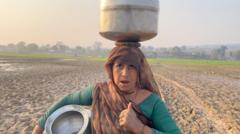In Madhya Pradesh, thousands of villagers, largely from indigenous communities, are rallying against the Ken-Betwa river-linking project, fearing displacement and environmental degradation, underscoring the tension between development and survival.
Protests Erupt Over India's Controversial Ken-Betwa River-Linking Project

Protests Erupt Over India's Controversial Ken-Betwa River-Linking Project
Villagers voice their concerns, highlighting the potential loss of homes and livelihoods as the government prioritizes infrastructure development.
In the central Indian state of Madhya Pradesh, a significant river-linking initiative, known as the Ken-Betwa project, has ignited widespread protests among local villagers. The controversial project, with a hefty budget of 440 billion rupees (approximately $5.06 billion), aims to divert surplus water from the Ken River to the Betwa River using a complex system of tunnels, canals, and dams. This marks the first of 16 river-linking projects described in India's National Perspective Plan, originally devised for water resource development back in the 1980s.
Despite its potential benefits -- including irrigation for over 1 million hectares of land, provision of drinking water for 6.2 million residents, and generation of 130 megawatts of hydropower and solar energy by 2030 -- the project faces harsh criticism from affected communities. Local protesters, primarily from the indigenous Gond and Kol tribes, fear that their homes and livelihoods will be destroyed, as at least 21 villages will be submerged by the dam's reservoir, displacing more than 7,000 families. "Our livelihood is intricately tied to this land; we are left uncertain about what comes next," lamented protester Tulsi Adivasi.
Environmental concerns are equally critical, with experts warning that the project may inundate nearly 98 square kilometers of the Panna Tiger Reserve, jeopardizing years of wildlife conservation efforts and leading to potential ecological consequences. Critics have highlighted that the government's assurances of thorough research and environmental clearances do little to alleviate their fears, as the core of a national park has never been repurposed for such a large-scale infrastructure project.
Despite the government's argument that this initiative could help alleviate distress in the drought-prone Bundelkhand region, skepticism persists among the villagers. Many express frustration at being displaced for projects that they argue do not benefit them. With insufficient compensation offers and vague relocation plans, the uncertainty hangs heavily over the displaced families. As Mahesh Adivasi expressed through protest songs, they feel that the promise of progress comes at an exorbitant and unjust cost, questioning the motives behind development that seems to disregard the very lives it affects.
Environmentalists warn that such precedents could lead to further exploitation of vulnerable ecosystems across India, emphasizing that development should not sacrificially encroach upon marginalized communities. The situation reflects an ongoing struggle within India to balance infrastructure growth with the rights and needs of its most vulnerable populations.




















